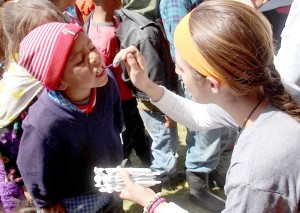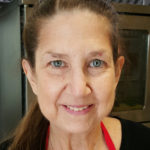By Lindsay Steele
The Catholic Messenger
FORT MADISON — When two Holy Trinity Catholic School students went to Guatemala on a medical mission trip, they expected to teach the local residents about tooth care and Jesus. They didn’t realize how much they would learn from those they hoped to help.

Lauren Pothitakis, a member of Holy Family Parish in Fort Madison, gives a Guatemalan child a flouride treatment during a service trip to Guatemala in February.
“They taught me that I need to value what’s important, help others and do what’s right and never take anything for granted, even if it’s just a small thing,” said Nicholas Pothitakis, a tenth-grader. He, along with his sister Lauren and mother Kara, went on the one-week trip in February with a Protestant group from Muscatine. The Pothitakises are members of Holy Family Parish in Fort Madison.
After a slow and chaotic 11-hour bus ride to the rural village of Escapotzi in the northern highlands of Guatemala, the trio was surprised at the simple and meager lifestyle of the residents. The villagers lived in crowded, drafty huts with limited food, little water for personal hygiene and virtually no access to dental or medical care. Nicholas said, “I didn’t realize anyone lived in that kind of situation. They showed us a house and I wondered, ‘Where’s their food at?’ All they really have is (cornmeal) and a piece of bread each day. On a holiday they might have some kind of meat. … No one here (in the United States) realizes what they go through every day. We have it so easy.”
Lauren, a senior at Holy Trinity, said most of the residents had never been able to take a proper bath and, because of a lack of access to medication or antibiotics, simple infections could prove deadly.
The Pothitakises provided fluoride treatments to villagers and taught them how to brush their teeth. They spent time in a medical tent as people came from miles around to be seen and receive basic pharmaceuticals. “The problems they had were so sad, so easily curable in the United States,” Lauren recalled. “One woman came in and said her daughter died from a stomach ache because they didn’t know what it was or how to treat it.”
Lauren recalled individuals with vision problems coming to the tent. “Very close up, they couldn’t read anything. We gave them a pair of glasses to see if that was the problem. Their eyes lit up. They were able to read right off. They lit up inside with joy! It’s so sad that one little thing they’ve been missing was so easy to fix and life changing.”
Despite living a lifestyle that most Americans would find harsh, the villagers demonstrated an abundance of gratitude. Lauren said, “I looked around and everyone had huge smiles on. That really touched us.”
The group also had an opportunity to evangelize at a school. Kara said the villagers have access to a Christian church and are familiar with Jesus; the evangelism efforts were mainly reinforcing the message. Lauren said, “We helped them understand more about him.”
The service group sang worship songs with the students, made beaded bracelets, read Scripture and played soccer with students. Soccer is a favorite pastime of the village children. The group brought new balls and a pump to replace the deflated, makeshift soccer ball the children had been using.
At the end of the school visit — and many times throughout the week of service — the village children were eager to give hugs to their new American friends. “They taught me that little things don’t matter as much as I thought they did and to treat every day as a blessing,” Lauren said. “Give love to each other, live every day to the fullest and just be happy no matter what.”
The group also donated hats, taught Western building techniques to the adults, helped them build a kitchen and learn to ventilate their huts. Villagers cook over a fire in the middle of the hut, leaving the huts full of soot that can be damaging to the lungs.
After returning to the United States and a more comfortable way of life, the Pothitakises found themselves missing the people of Guatemala. They hope to return for future service and mission work there.
“They are very special people,” Lauren said.











